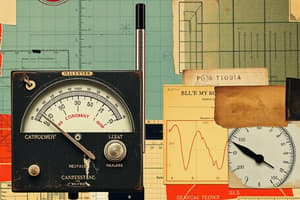Podcast
Questions and Answers
What type of product is a Class 1 Product?
What type of product is a Class 1 Product?
- General Electronics Product (correct)
- High Performance Electrical Product
- Dedicated Service Electronic Product
- None of the above
Which class of product requires continued performance and extended life?
Which class of product requires continued performance and extended life?
- Class 1 Product
- Class 2 Product (correct)
- Class 3 Product
- None of the above
What does a Class 3 Product indicate?
What does a Class 3 Product indicate?
- General Electronics Product
- High Performance Electrical Product (correct)
- Dedicated Service Electronic Product
- None of the above
Who has the ultimate responsibility for identifying the class to which the assembly is evaluated?
Who has the ultimate responsibility for identifying the class to which the assembly is evaluated?
Does 'shall' invoke a requirement for compliance?
Does 'shall' invoke a requirement for compliance?
Order of precedence in event of conflict first considers the ______.
Order of precedence in event of conflict first considers the ______.
What defines a condition that is close to perfect but not always achievable?
What defines a condition that is close to perfect but not always achievable?
What is a defect condition?
What is a defect condition?
Is it required for the disposition of individual process indicators?
Is it required for the disposition of individual process indicators?
What should the illumination at the surface of workstations be at least?
What should the illumination at the surface of workstations be at least?
What can cause a cold solder connection?
What can cause a cold solder connection?
Are eating, drinking, or use of tobacco products in the work area permitted?
Are eating, drinking, or use of tobacco products in the work area permitted?
Should work areas be kept clean and neat?
Should work areas be kept clean and neat?
What are typical contaminants that might cause soldering and coating problems?
What are typical contaminants that might cause soldering and coating problems?
What should be done to prevent ESD and EOS damage to sensitive components?
What should be done to prevent ESD and EOS damage to sensitive components?
Flashcards are hidden until you start studying
Study Notes
IPC A 610 Classifications
- Class 1 Product: General electronics focusing on basic functionality.
- Class 2 Product: Dedicated service products requiring consistent performance; uninterrupted service desired but not mandatory.
- Class 3 Product: High-performance products critical for operations; used in life-support systems where downtime is unacceptable.
Responsibilities and Compliance
- Ultimate Responsibility: Customer determines the product class for assembly.
- Mandatory Requirements: "Shall" indicates strict adherence to standards; noncompliance is significant.
Order of Precedence
- Conflict Resolution: Follows procurement agreements documented between customer and supplier.
- Master Drawings: Supersede any conflicting documents reflecting explicit customer requirements.
- IPC-1-610: Activated by customer or contract in conflicts.
- Non-IPC Cited Documents: Prioritized through procurement documents.
Quality Conditions
- Target Condition: Ideal but unrealistic state for assemblies.
- Acceptable Condition: Maintains integrity without being perfect.
- Defect Condition: Assembly fails to meet end-use standards; impacts all classes based on severity.
Defect Handling
- Defect Hierarchy: Class 1 defects imply Class 2 and 3 issues; Class 2 defects imply Class 3 issues.
- Disposition: Manufacturer decides on the treatment of defects (e.g., rework, repair).
- Process Indicators: Non-defect conditions that require monitoring but not individual disposition.
PCB Sides and Connections
- Primary Side: Main component side of PCB; contains most components.
- Solder Source Side: Usually the secondary side where solder is applied.
- Solder Destination Side: Where solder flows during assembly.
Soldering Problems
- Cold Solder Connection: Poorly made joints characterized by grayish appearance; caused by various soldering failures.
- Electrical Clearance Violations: Considered defects for all classes.
Component Configuration
- Meniscus: Sealant excess on leads; includes various materials.
- Nonfunctional Land: Electrically disconnected area on a PCB.
Wire Configurations
- Wire Overwrap: More than 360 degrees wrap that maintains contact.
- Wire Overlap: More than 360 degrees but crosses over itself losing terminal contact.
Inspection and Regulation
- Inspection Methodology: Inspector does not assign class during inspections; relies on predefined criteria.
- Verification Requirements: Measurements are generally not mandatory except for reference.
- Magnification Tolerance: +/- 15% of selected power for aids.
- Illumination Standards: Workstation lighting must meet at least 1000lm/m².
ESD and EOS Management
- ESD (Electrostatic Discharge): Quick charge transfer that can damage components.
- EOS (Electrical Overstress): Damage caused by excessive electrical energy from unintended sources.
- Static Shielding Packaging: Protects assemblies from electrostatic damage.
Work Area Standards
- Food and Tobacco: Prohibited in work areas to prevent contamination.
- Cleanliness: Essential for maintaining quality and avoiding soldering issues.
- Contaminants: Includes body oils, salts, and unauthorized hand creams; can affect soldering.
Preventative Measures
- ESD and EOS Protection: Handle all sensitive components at static-controlled workstations to mitigate damage risks.
Studying That Suits You
Use AI to generate personalized quizzes and flashcards to suit your learning preferences.




